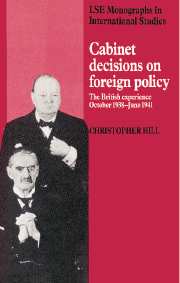Book contents
- Frontmatter
- Contents
- List of figures
- List of tables
- Acknowledgements
- Preface
- 1 Cabinets, foreign policies and case-studies
- 2 Constructing the Polish Guarantee, 15–31 March 1939
- 3 The Soviet question, April–August 1939
- 4 Entry into war, 1–3 September 1939
- 5 Reacting to the ‘peace offensive’, October 1939
- 6 To continue alone? May–July 1940
- 7 The longer term: War Aims and other committees, October 1940–June 1941
- 8 Decision-making in Cabinet
- Appendix 1 The Chamberlain Cabinet, 31 October 1938–3 September 1939
- Appendix 2 Attendance at the Foreign Policy Committee of the Cabinet, 14 November 1938–25 August 1939
- Appendix 3 Neville Chamberlain's statement in the House of Commons, 12 October 1939
- Appendix 4 Lord Halifax's paper for the War Aims Committee, October 1940
- Appendix 5 Anthony Eden's speech at the Mansion House, 29 May 1941 (extract)
- Notes
- Bibliography
- Index
- LSE MONOGRAPHS IN INTERNATIONAL STUDIES
7 - The longer term: War Aims and other committees, October 1940–June 1941
Published online by Cambridge University Press: 02 February 2010
- Frontmatter
- Contents
- List of figures
- List of tables
- Acknowledgements
- Preface
- 1 Cabinets, foreign policies and case-studies
- 2 Constructing the Polish Guarantee, 15–31 March 1939
- 3 The Soviet question, April–August 1939
- 4 Entry into war, 1–3 September 1939
- 5 Reacting to the ‘peace offensive’, October 1939
- 6 To continue alone? May–July 1940
- 7 The longer term: War Aims and other committees, October 1940–June 1941
- 8 Decision-making in Cabinet
- Appendix 1 The Chamberlain Cabinet, 31 October 1938–3 September 1939
- Appendix 2 Attendance at the Foreign Policy Committee of the Cabinet, 14 November 1938–25 August 1939
- Appendix 3 Neville Chamberlain's statement in the House of Commons, 12 October 1939
- Appendix 4 Lord Halifax's paper for the War Aims Committee, October 1940
- Appendix 5 Anthony Eden's speech at the Mansion House, 29 May 1941 (extract)
- Notes
- Bibliography
- Index
- LSE MONOGRAPHS IN INTERNATIONAL STUDIES
Summary
Survival and the dramatic transformation in the character of the war were the issues with which the Cabinet struggled throughout the twelve months from the fall of France to Hitler's ultimately fateful attack on the Soviet Union. In policy-making terms, this produced a tension between the inevitable involvement of all ministers in a period of prolonged, unprecedented national crisis and the circumstantial needs for decisive personal leadership and diminished accountability from those responsible for grand strategy. In the first phase of the crisis, as we have seen, this led to emotion and uncertainty in Cabinet, resolved by the strength of Churchill's will and vision in a situation which was conducive to the assertion of prime ministerial initiatives. After the first febrile weeks, however, while the crisis remained, its temperature was sufficiently lowered to enable ministers to take a longer perspective on the war and its prospects. In particular, this meant that the discussion of war aims rose once again to the surface, and the coalition Cabinet wrestled for the first time with the strains of conducting day-to-day military campaigns at the same time as debating a putative post-war order. They attempted this task largely through the device of delegation to Cabinet committees, and it is the performance of these committees which forms the subject of this last case-study chapter. To what extent did they provide the means for a genuinely collective consideration of war aims, or for the mobilisation of special views and interests? How far, by contrast, could they be manipulated or ignored by a Prime Minister who was taking increasing strength from his evident indispensability?
- Type
- Chapter
- Information
- Cabinet Decisions on Foreign PolicyThe British Experience, October 1938–June 1941, pp. 188 - 223Publisher: Cambridge University PressPrint publication year: 1991

